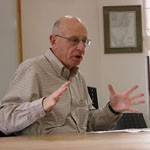
JERUSALEM — Coping is a synonym for political management. It’s especially prominent in situations of intense conflict, when competing groups can’t make crisp decisions.
It’s marked by doing a bit of this, and a bit of that, without overcoming the conflict.
There’s also avoidance and ambiguity.
Avoiding the knotty problems, and fashioning something that does not touch what is sensitive.
Currently Israel is a world leader in something bad: the incidence of Coronavirus infections in relation to population.
The prime cause of the situation is a setting of conflict that gets in the way of dealing with it. The ultra-Orthodox population, and the Arab population are the principal sources of infection, and–especially the ultra-Orthodox–are the major inhibitors of dealing with it.
We’re hearing different assessments of the illnesses and deaths in those two communities, with no clear figures. It’s as if officials are reluctant to publicize details, due to the political sensitivities.
Infections have gone far beyond those two communities. Our own teenage nephew has been diagnosed as infected, perhaps picked up from his secular school. And our first-grade granddaughter has been isolated due to an infected classmate.
However, the Arab tendency to large weddings and the ultras-Orthodox insistence on continuing education, praying in synagogues, and large ceremonies for one or another purpose are disproportionately responsible for the overall rate of infections.
Our government has been meeting for long hours on several days. And has reached a decision to largely close down almost everything until the end of Sukkot.
Coping? To be sure.
The principal issues were closing synagogues over Yom Kippur and halting the protests against the Prime Minister.
Neither issue could be resolved without the other. And the result was to impose a major lockdown, going beyond the recommendations of the Coronavirus Czar and a host of physicians and economists. But it was the only way a 13-hour long meeting could be concluded.
Yet synagogue closings have been left unclear.
They remained open for Yom Kippur, but a number of Rabbis have urged their followers to stay away from the synagogues.
Government discussions about demonstrations went on for hours, reflecting the obsession of Netanyahu. But Gantz opposed their closing down, and ultimately no decision could be finalized.
Like synagogues on Yom Kippur, the issue remained open.
But thousands gathered outside Netahyahu’s official residence, and others protested alongside his private home along the coast, and at various other sites throughout Israel.
Also to be left open will be food and medical facilities, along with financial operations, with a minimum of public transportation. And perhaps workplaces that do not involve people to be served.
Actually, it’s unlikely to work smoothly. A number of entrepreneurs have indicated that they’ll violate the provisions, and be willing to pay the fines imposed on them. And we can assume that the ultra-Orthodox will ignore the closings and continue with their schooling, prayers, and other meetings for this and that. They won’t be satisfied with the notion of prayers outside of synagogues or the closing of stalls to sell the four kinds of vegetation needed to be shaken on Sukkot.
The general closure goes against the urging of the Caronavirus Czar and a number of physicians and economists, including some ministers associated with the government.
Criticism in the media does not add to the general belief in the wisdom of officials. Doubts, disbelief, and ignoring what comes from above are rampant.
Dominant in all of this is the Prime Minister, who is doing what he can to avoid a dismal end to his career. He’s the subject of three indictments and is scheduled for a trial, likely to last more than a year. And his resignation is the focus of continuing demonstrations close to his official residence, his weekend private home, and on bridges here and there throughout the country.
So far there is no sign that he’s willing to go peacefully. And the prosecutors have not ruled him out of continuing as Prime Minister.
So all that he decides is interpreted as protecting himself, in one way or another.
Yet there is growing discussion in the media about a deal, requiring him to leave politics in exchange for cancelling his criminal trial.
But so far the Legal Adviser to the Government remains fixed in his demand for a full trial.
And there’s a lot of confusion about Coronavirus. If you hear 100 experts you’ll get 100 variations on the nature of infections and ways to respond.
Add the political splits in the population, the political weight of the ultra-Orthodox, the personal legal problems of the Prime Minister, and the lack of conclusive information about Coronavirus, and you have more than enough reasons to avoid clear and decisive decisions about what to do.
We don’t know how this closure will be implemented.
Will the police act against the ultra-Orthodox, Arabs, and the variety of Jews who continue ignoring the closures?
Most likely most Israelis seem likely to obey the decision.
What about the masses of children riding bicycles in the streets on Yom Kippur, when almost all drivers avoid their cars?
Will there be masses of individuals outside of synagogues? And will the ultra-Orthodox–or most of them–obey the rules or disregard them?
Infections remain high, and are likely to climb as a result of Yom Kippur prayers.
Lots of coping, and much confusion.
Yom Kippur passed without public transportation, radio or television, and with few automobiles on the road. It was a time for reflection, with or without fasting or synagogue attendance.
Wishing you all a good year, and גמר חתימה טובה
*
Ira Sharkansky is professor emerituss of political science at Hebrew University. He may be contacted via ira.sharkansky@sdjewishworld.com